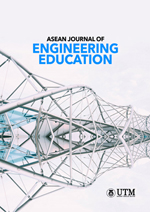Knowledge, Attitude, and Readiness to Practise among Malaysian Undergraduate Engineering Students Towards Disaster Management Preparedness
DOI:
https://doi.org/10.11113/ajee2023.7n1.117Keywords:
Attitude, Engineering students, Readiness to practice, Knowledge, Disaster managementAbstract
Malaysian National Security Council (MNSC) defines disaster as an incident that occurs unexpectedly, resulting in the loss of lives and damage to properties, environment and daily activities of the local community. Disastrous events such as floods, earthquakes, terrorism, increase in population, cyber-attacks, pandemics, rising sea levels, economic recessions, urbanization, etc., have been increasing globally and also in Malaysia. The wellbeing of our Malaysian communities depends on a complex web of institutions, infrastructure and information. To reduce the disaster risk and impact, various efforts have to be in place to prepare and empower the community. As such, this paper is positioned at understanding this preparedness level among undergraduate engineering students in Malaysia. During emergencies, such undergraduate students should be able to rise and assist in national development from a disaster. In this study, we are focused to evaluate the engineering students in Malaysia in particular for knowledge (K), attitude (A) and readiness to practice (rP) regarding disaster preparedness. This is an exploratory study done through a questionnaire distributed among engineering undergraduate students in some selected public (one) and private universities (two) in Malaysia. Almost half of the participants understood that Malaysia is at risk of disasters and that these disasters come in many size and shapes. These participants also significantly understand the potential of risk of emergencies in Malaysia. However, the respondents indicated that they have not had real exposure or handling experience on this topic. There was a huge agreement that there is a lack of support from local officials in terms of organizational logistics and roles among local and national agencies in disaster response. This study has shown that the literature is scarce in terms of understanding the student agency for disaster preparedness. There is a need for relevant stakeholders like the Board of Engineers Malaysia to prepare engineering undergraduates for disaster management to strengthen the social fabric towards such risks.



















